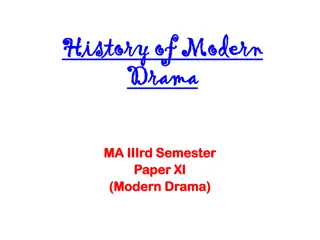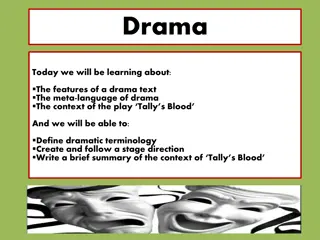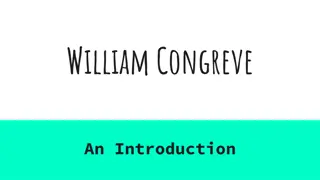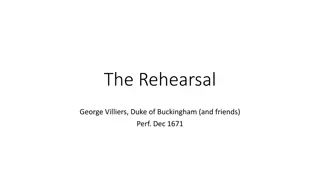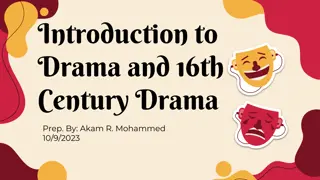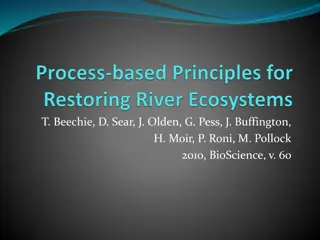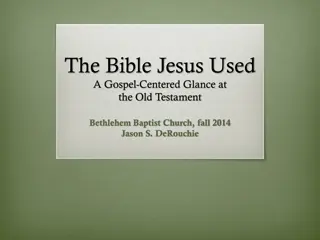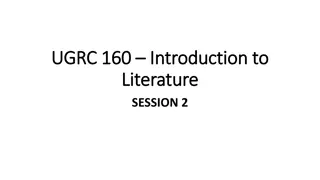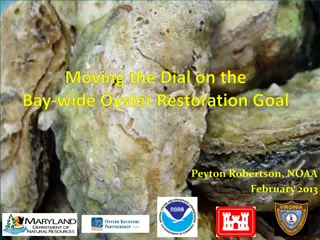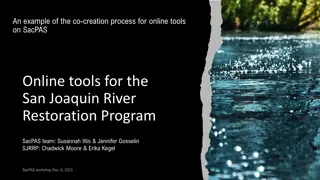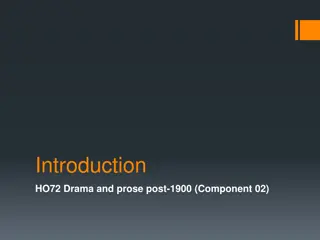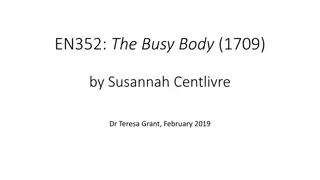Exploring Restoration Drama and Prose in the Era of Charles II
In 1660, with Charles II's ascent to the throne, Restoration literature saw a revival alongside the political landscape. Playwrights like John Dryden and Thomas Otway contributed significant works, with genres ranging from heroic plays to satirical comedies. The era also witnessed the emergence of the Comedy of Manners, reflecting societal shifts. Explore the theatrical richness and literary innovations of the Restoration period through this captivating review.
Download Presentation

Please find below an Image/Link to download the presentation.
The content on the website is provided AS IS for your information and personal use only. It may not be sold, licensed, or shared on other websites without obtaining consent from the author. Download presentation by click this link. If you encounter any issues during the download, it is possible that the publisher has removed the file from their server.
E N D
Presentation Transcript
Restoration Drama and Prose Bet l ALTA
Charles II became the king in 1660. The change in the government was as great as the change in the literature. Theatres opened again. New Dramatists appeared.
One of them was John Dryden. He wrote plays in heroic couplets. One of his best heroic plays is The Conquest of Granada (1670). Another of his heroic plays is Aurengzebe (1676). *restoration, return to rule by kings in 1660 after twenty years of rule by Parliament.
In his plays, fine speeches and poor ones might follow each other in an astonishing way. His first comedy Marriage-a-la-Mode in bad blank verse, appeared in 1672. His well-known play, All for love (1678) which is based on Shakespeare s Antony and Cleopatra is in blank verse. However, it was not valued highly.
Don Sebastian is considered as his best play. There is usually some good and bad writing in his plays. Some of the men of his time found it stupid to see extra-ordinary situations in his heroic plays.
The second Duke of Buckingham produced a comedy, The Rehearsal (1672) which satirized them. * rehearsal * satire * satirist
Thomas Otway wrote three tragedies: Don Carlos The Orphan *Venice Preserved A new kind of Comedy, The Comedy of Manners, appeared at the end of this century .
This kind of comedy was bright and witty but heartless. It was introduced by Sir George Etherege, The Man of Mode . William Wycherley was a satirical dramatist. The Country Wife His best plays The Plain Dealer
The better than these were: The plays of William Congreve: His first comedy was The Old Bachelor. The Double Dealer Love for Love These three plays followed Etherege s style but The Way of the World is finer than any other play of the time. * Unfortunately, it was not well received, and Congreve stopped writing plays.
Sir John Vanbrugh wrote: The Relapse (1696) The Provoked Wife (1697) The Confederacy (1705) These plays reflect the behaviour of upper-class society of the time. Many people were reading Paradise Lost by Milton.
Others read the Pilgrims Progress , John Bunyans great allegory of Christian s journey to heaven. Olivier Goldsmith wrote She Stoops to Conquer (1773). Richard Brinsley produced The Rivals (1775) and The School for Scandal (1777). His third important play was The Critic, a satire.
John Drydens critical works include his Essay on Dramatic Poesie (1668). Dryden defended the use of rhyme in drama and he praised Shakespeare. Dryden s prose is very significant. He compared English and French drama and mentioned the limitations which the French set themselves by keeping to unities of time and space.


